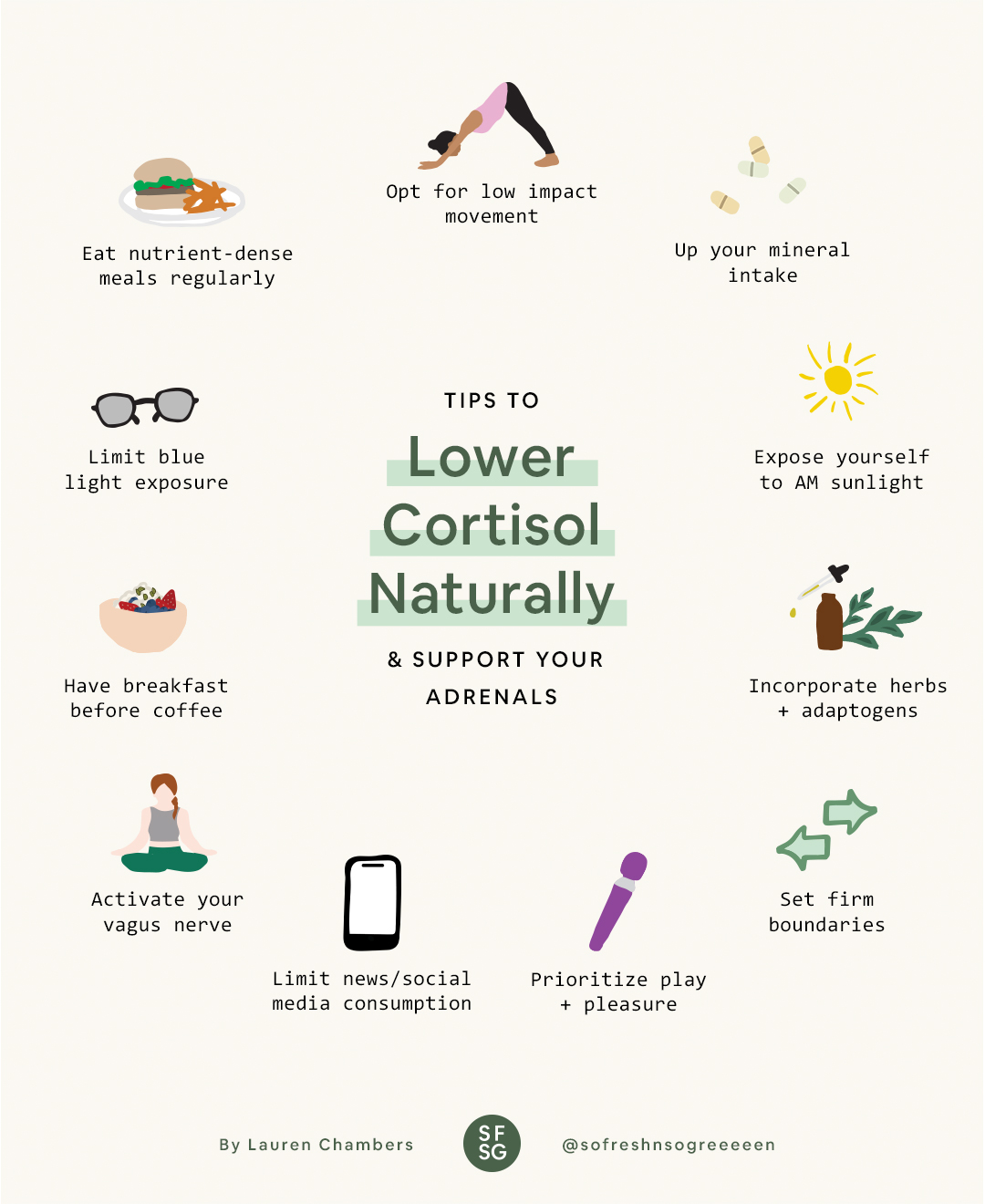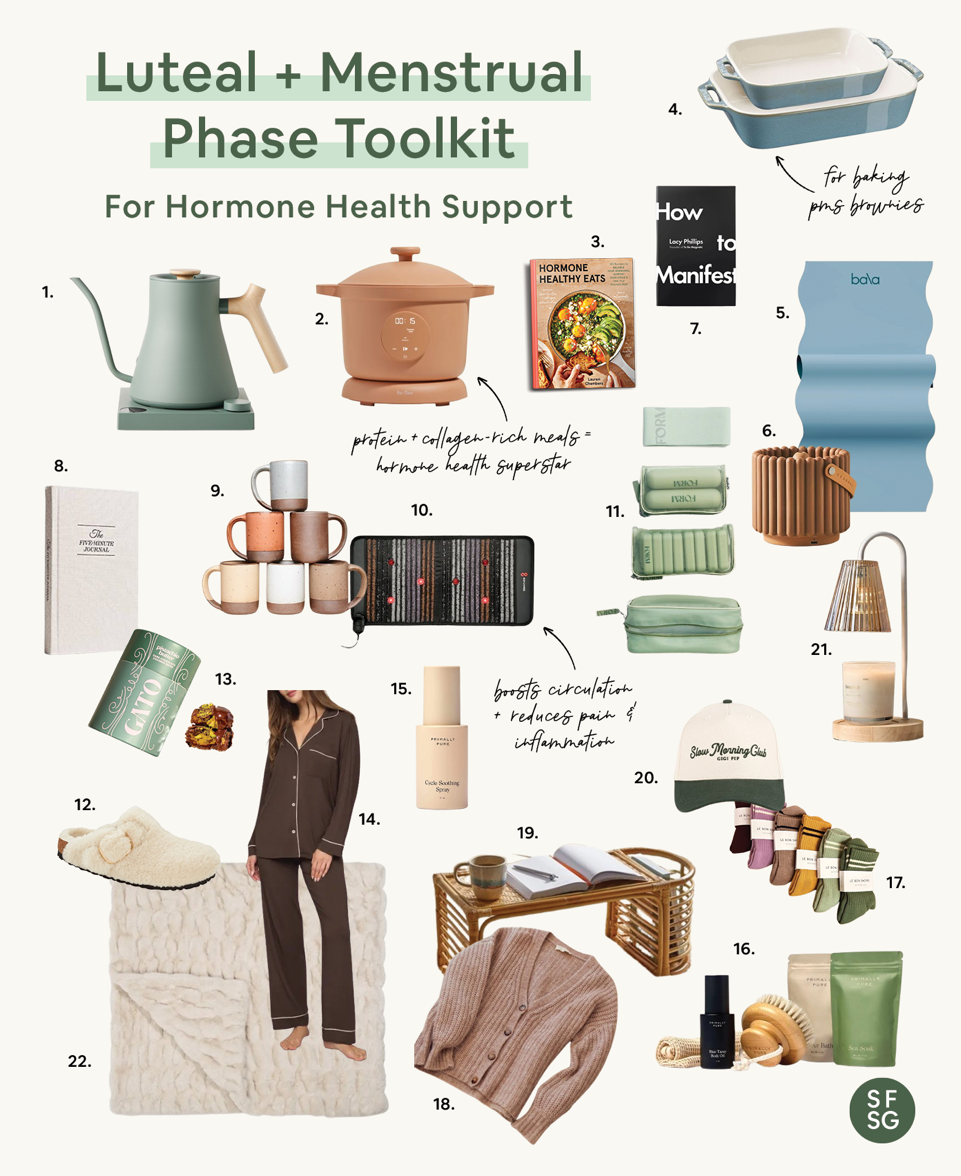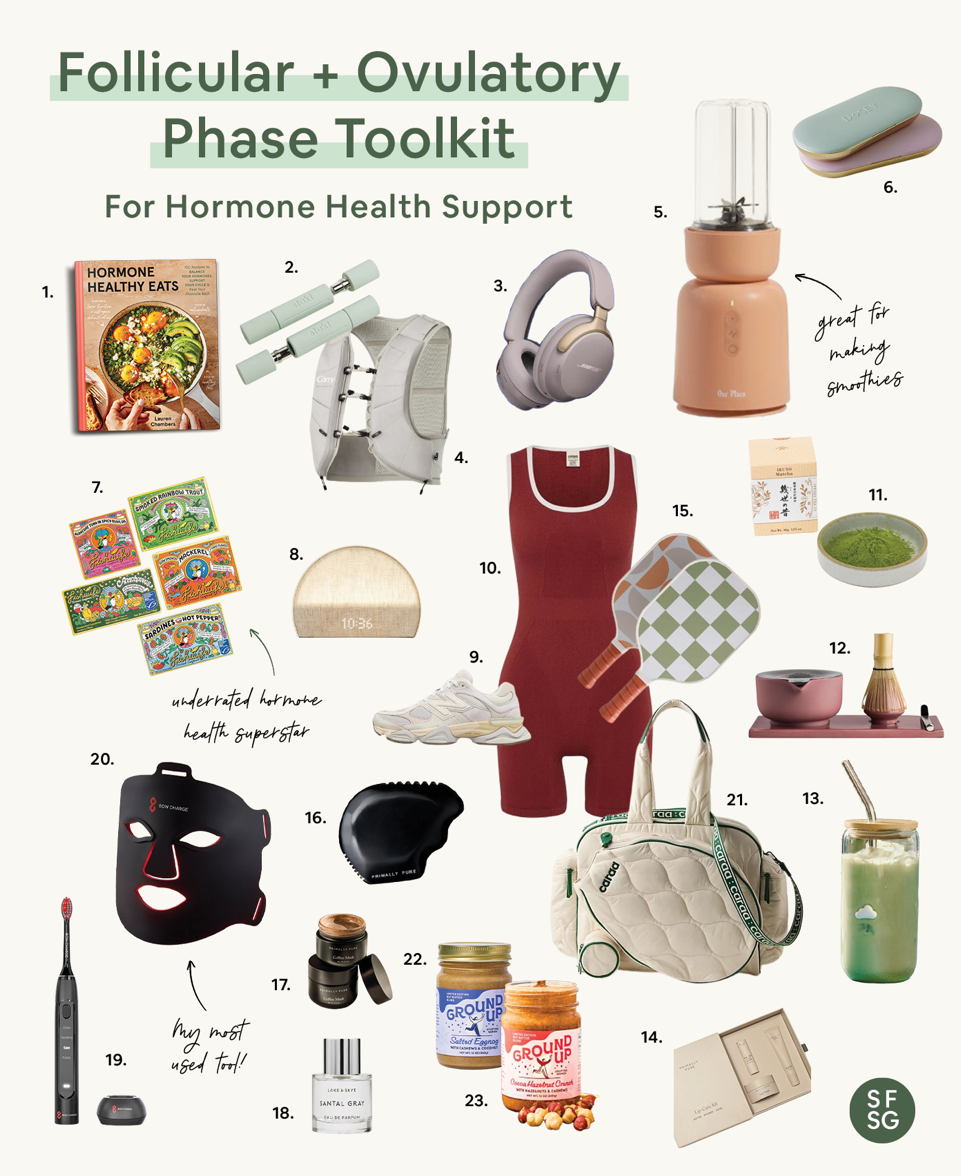recipes
lifestyle
wellness
motherhood
mindset
About
E-Books
Blog
Freebies
partnerships
hi, i'm lauren!
hey there!
I’m on a hot mission to help you balance your hormones & live your best life.
categories
Home
Quiz
Get In Touch
The Course
search:
Cookbook
Recipe key
GF
VG
P
Vegan
Gluten Free
Paleo
DF
Dairy-Free
download now
Join Hormone Healthy Eats!
Become a SFNSG insider to get my monthly Substack, Hormone Healthy Eats! Packed with the latest hormone-healthy recipes
+ tips.
jump to recipe >
Cortisol, our primary stress hormone, seems to be a buzzword these days, and it makes sense given everything going on in our modern world and the mental, physical and emotional challenges so many of us (especially women) face on a daily basis.
While chronic stress exposure can be detrimental to our hormones and overall health, it’s a lot more complex than that, and we actually NEED our stress hormones, not just for survival, but for so many other important biological functions.
Thus the goal isn’t to have low cortisol levels or rid our body of stress hormones, rather to address any root causes of high cortisol in order to promote a healthy cortisol balance and rhythm in the body, which is essential to looking and feeling our best.
This post covers some of the simple, yet most impactful habits you can begin incorporating in order to help you lower cortisol naturally (for more information on how to tell if you have a cortisol imbalance, check out this post).
Need a recipe plan to help you balance blood sugar and stress hormones? Check out my 28 Day Hormone Balance Reset Plan.
WHAT IS CORTISOL?
Cortisol is a stress hormone (along with adrenaline) produced by our adrenal glands, which sit atop our kidneys. Our adrenal glands communicate directly with our brains, specifically the hypothalamus region and the pituitary gland, which altogether is known as the Hypothalamic- Pituitary- Adrenal Axis or HPA axis for short. This axis is responsible for adjusting the balance of hormones in response to stress.
When cortisol is released by the adrenal glands in response to a perceived stressor recognized by the brain, it works to:
-
+ Mobilize energy from storage sites (such as muscles and tissues) in the body for immediate use
-
+ Break down molecules to release energy
-
+ Reduce inflammation and allergies
-
+ Prevent the loss of sodium in the urine to help maintain blood volume and blood pressure
-
+ Help maintain mood and emotional stability
WHAT IS HIGH CORTISOL OR A CORTISOL IMBALANCE?
As you can see, cortisol plays a very important role in our bodies, especially when danger is imminent. But, while highly effective at keeping our species alive, the primary problem with our stress response system is that it’s still stuck in the primal ages. Meaning that it can’t differentiate between a life or death situation vs. every day modern stressors we’re exposed to such as work emails, sitting in traffic, tensions with family or reading the news. No matter the details, any perceived stressor triggers the exact same chemical response.
Thus repeat exposure to “stressors” often leads to an overproduction of cortisol, a hormone imbalance known as high cortisol. This can present with either consistently high cortisol levels or a dysregulated rhythm in cortisol where it is low in the morning (when you need it to be high to sustain energy levels throughout the day) and high at night (when you need it to be lower in order to get a restful night’s sleep).
HOW STRESS IMPACTS OUR HORMONES
It’s important to understand some of the ways chronic stress affects our hormones, which THEN lead to the symptoms we experience as a result. These include:
+ LOWERS PROGESTERONE
All of our steroid hormones, including progesterone, estrogen, testosterone, DHEA and cortisol are made from a precursor hormone called pregnenolone. Chronic cortisol output requires more of the precursor pregnenolone, and it “steals” this hormone, primarily from progesterone, in a process known as the “pregnenolone steal.” Low progesterone is a common hormonal imbalance associated with symptoms ranging from pms to fertility challenges.
+ INCREASES ESTROGEN LEVELS
When cortisol lowers progesterone, both by stealing the precursor pregnenolone and by decreasing the effectiveness at which progesterone gets into the cells, it can lead to estrogen dominance (progesterone is needed to keep estrogen levels in check). This is yet another common hormonal imbalance that often includes symptoms ranging from heavy and painful periods to cyclical acne.
+ LOWERS TESTOSTERONE
Chronic stress exposure activates the HPA axis, thereby naturally inhibiting the activity of the hypothalamic-pituitary-gonadal axis (HPG axis), which can block androgen receptors and lead to a decrease in testosterone production which is necessary for a healthy menstrual cycle, fertility, libido and mood.
+ DELAYS OR PREVENTS OVULATION
Chronic cortisol production communicates to your ovaries to naturally decrease estrogen and progesterone production and marks ovulation, a process that requires a lot of nutrients and energy, as low priority, in order to divert the resources to a much higher priority potential life or death situation (which we know it often actually isn’t). Ovulation is THE cornerstone of a healthy menstrual cycle (you cannot have a true period without it) and it’s also needed for progesterone production, not to mention a necessary part of conception.
+ LOWERS THYROID FUNCTION
When cortisol levels are chronically elevated, it signals to the thyroid gland to stop producing as much thyroid hormone. It also restricts the conversion of inactive thyroid hormone T4 to active thyroid hormone T3, which is the form of thyroid that cells can actually use, leading to low thyroid function and symptoms including weight gain, hair loss, constipation, and heavy or missing periods.
Along with these hormonal imbalances, chronic cortisol output can also lead to an increase in inflammation and blood sugar instability, decrease in muscle mass, impaired digestion and depletion of nutrients and place a burden our liver, all of which can contribute to the symptoms mentioned below.
SYMPTOMS OF HIGH CORTISOL LEVELS IN FEMALES
Symptoms of chronically elevated cortisol levels can present in females in a myriad of ways, and are also commonly linked to other hormone imbalances such as low thyroid, low progesterone and excess estrogen (see above). For a full list of the most common symptoms I see with female clients in my practice, check out this post.
ROOT CAUSES + TRIGGERS OF HIGH CORTISOL LEVELS IN FEMALES
Obviously, exposure to chronic stress is the underlying root cause of high cortisol levels, but that can be pretty broad. To narrow it down, I teach my clients about the four distinct types of stress that have a direct impact on our adrenal glands and cortisol levels, which you can read about more in this post.
TIPS TO LOWER HIGH CORTISOL LEVELS NATURALLY
While it’s not realistic to “get rid of” stress, the good news is most of us have tools at our disposal to both reduce exposure to chronic stressors and boost our stress resilience, thereby protecting our hormones and adrenal glands and mitigating some of the negative effects. These are my top tips:
+ EAT NUTRIENT-DENSE MEALS REGULARLY
Regularly eating meals and snacks with quality protein, fat and fiber provides your hormones with the building blocks needed to keep blood sugar stable, critical to keeping stress at bay. When blood sugar gets too low, due to either consuming nutrient void meals that spike then crash blood sugar or from eating habits such as fasting, skipping meals, or not eating enough, your body’s stress response kicks into gear, with cortisol working to mobilize stored energy in order to bring your blood sugar back into balance. Thus if you want to avoid activating this stress response, it’s vital to consume balanced meals regularly.
+ OPT FOR LOW IMPACT MOVEMENT
When you engage in an intense physical activity (such as crossfit, bootcamp or marathon training) your adrenals pump out stress hormones adrenaline and cortisol in order to mobilize energy needed to complete the strenuous workout. While these workouts can be beneficial (as they create acute bouts of stress, which are a good thing in small, spare amounts) if you’re already dealing with elevated stress levels I suggest opting for more gentle, low impact forms of movement that have been scientifically proven to reduce stress, such as walking, low incline hiking, yoga, tai chi and low impact strength training, all of which help to activate our parasympathetic nervous system, aka our rest and digest mode.
+ UP YOUR MINERAL INTAKE
Our body uses up vitamins and minerals quickly in a stressed out state, which overtime can lead to nutrient deficiencies that are seen as a key culprit in hormonal imbalances. To negate the effects of stress and build up our stress resilience, it’s important to consume plenty of minerals such as magnesium and zinc, along with vitamins a, b, c and e from food sources such as wild-caught fish and shellfish, eggs, nuts and seeds, leafy greens and green vegetables, mushrooms, oats and gluten-free grains, citrus, berries and dark chocolate.
+ INCORPORATE HERBS + ADAPTOGENS
While I always encourage focusing on foods first, sometimes our bodies need additional support, which is where herbs, adaptogens and supplements come into play. Please remember to check in with your medical practitioner before taking, especially if you have a pre-existing medical condition, are currently taking other medications or pregnant. All of that being said, here are some of my favorite herbs and supplements for adrenal support:
-
+ Passionflower – said to help with anxiety and sleep challenges, as well as menopausal symptoms and even ADHD
-
+ Valerian Root – known for its calming effects, primarily used for insomnia and anxiety
-
+ Chamomile – recognized as a mild tranquilizer and sleep inducer
-
+ Lavender – reduces blood pressure and heart rate, can help with menopausal symptoms
-
+ Lemon Balm – preliminary studies have found it may improve mood and sleep while reducing anxiety
-
+ Ashwagandha – an adaptogen that helps regulate the effects of stress on the body
-
+ Rhodiola Rosea – used in Europe, Asia and the Artics for centuries as a natural remedy to stress
-
+ Magnesium Glycinate – A mineral that the body uses to regulate dozens of processes, from the functioning of nerves and muscles to the synthesizing of protein and bone which gets depleted with chronic stress *I use this brand and you can use the code SOFRESH15 to save $
-
+ Zinc – Helps raise levels of GABA, a neurotransmitter that produces a calming effect on the body
-
+ L-Theanine – an amino acid found in green tea believed to have a relaxing effect on the body
+ EXPOSE YOURSELF TO AM SUNLIGHT
This is such an underrated but effective practice, not just for reducing stress but for optimizing your sleep/wake cycle and promoting many other aspects of your hormonal health. Because human beings are diurnal, meaning we follow a 24 hour pattern of light and darkness (aka our first biological rhythm, the circadian rhythm) our brain takes cues from light via the eye’s retina throughout the day, and based on these signals, sends messages to our hormones to ramp up production, including cortisol (to increase energy and alertness) or melatonin (to induce relaxation and sleep).
Thus, variations in ambient light throughout the day critically impact our hormonal responses, either hindering our sleep/wake cycle or optimizing it. Exposing ourselves to ambient (aka red light) first thing in the morning via the sun helps to regulate the adrenal glands and prime a proper cortisol secretion pattern, where we experience more in the morning to help us stay alert throughout the day, and have it naturally diminish in the evening, helping us get a restful nights sleep. If possible, aim to face the sun every morning for a minimum of three minutes.
+ LIMIT BLUE LIGHT EXPOSURE
Along with exposing ourselves to natural sunlight, we want to be taking steps to lower our exposure to artificial light in order to optimize our biological pattern and naturally lower cortisol levels, especially in the evening. If you can, try to set a time each night when you put away all electronic devices OR wear blue light blocking glasses if needed (I swear by this brand, use the code SOFRESH15 to save $). Bonus points for swapping artificial lighting for amber lights or even candle light.
+ HAVE BREAKFAST BEFORE COFFEE
As you just learned, cortisol is typically highest in the morning, and drinking a caffeinated beverage like coffee on an empty stomach spikes then crashes our blood sugar, creating a stress response first thing and setting the tone for a blood sugar roller coaster the rest of the day (hello cravings, increased hunger, fatigue, mood swings, etc.) Because I don’t expect most people to give up coffee cold turkey (including yours truly) I encourage having it after a nutrient-dense breakfast rich in protein, fat and fiber. This helps to slow the rate at which coffee enters your blood stream, curbing a glucose spike and stress response.
+ SET FIRM BOUNDARIES
Learning how to set and uphold firm boundaries is one of my top nonnegotiables for stress reduction and balanced hormones, as they help conserve your emotional and physical energy, develop autonomy and independence, boost assertiveness and self-esteem, stay true to yourself and personal needs, and ultimately improve your connection to others (especially those worthy and respectful of your time!)
Self-awareness and checking in with yourself regularly is key in setting boundaries, and I especially recommend doing this at each phase in your menstrual cycle, noting how changes in your energy, mood and hormones affect what you’re willing and wanting to say yes to (as well as what you need to say to no to in order to feel your best). Ultimately, it will help keep you from adding too much on your most likely already crowded plate, working to reduce daily stressors and ultimately avoid burnout.
+ ACTIVATE YOUR VAGUS NERVE
Your vagus nerve modulates the parasympathetic nervous system, and strengthening it has been shown to improve resilience to stress. Taking deep breaths, meditation, massage, cold water immersion, gargling water, chanting, singing and humming (especially along to music), certain herbs (like those listed above) and even experiencing awe or wonder have all been shown to naturally stimulate your vagus nerve. *I love to focus on techniques like these for quick “in the moment” stress reducers.
+ LIMIT NEWS/SOCIAL MEDIA CONSUMPTION
Studies have shown repeatedly checking the news puts people in a “constant state of high alert,” with people reporting negative impacts on their stress, mental health and difficulty staying present. Additionally, constant social media consumption or “doomscrolling” (the tendency to surf or scroll through bad news) has been linked to elevated stress levels, anxiety and poor mental health. Try limiting the amount of time you spend on news sources or social media each day (there are apps you can use to track and manage this on your phone) or scheduling more phone-free activities in your day and in-person quality time instead.
+ PRIORITIZE PLAY + PLEASURE
Speaking of in-person connection, prioritizing play and pleasure, both with others and yourself, works to relieve stress and anxiety by triggering the release of “feel good” hormones like oxytocin, serotonin and dopamine, which promote a sense of calm, joy, freedom and wellbeing. I typically have my clients make a stress inventory checklist, and part of this process is for them to write down the people, activities or hobbies that bring them joy, then figure out a way they can begin regularly incorporating them into their routine. This obviously depends on personal preferences, but can include anything from spending time in nature, to playing a sport, reading a book, doing arts and crafts, engaging in sexual intimacy, or quality time with people you love.
BOTTOMLINE
Supporting your stress hormones really comes down to two key concepts: reducing exposure to chronic stressors and prioritizing habits that build stress resilience. Adding in small, daily habits (such as those listed above) increase your physical, mental and emotional resilience and help you negate the effects of stress in a myriad of ways, from quelling your body’s stress response to adapting to challenging situations more quickly, and even bouncing back from a stressful event with minimal effects on your hormones.
As always, the type of stress you experience on a day to day basis, as well as how you perceive and cope with it, is completely unique to you, and can depend on SO MANY different factors, which is why it’s important to tailor to your individual lifestyle and needs.
Thus in order for you to actively reduce YOUR unique stressors, it’s vital for you to take inventory of your daily schedule, including your habits, activities, commitments, social and relational interactions, along with your eating and exercise habits, toxin exposure, etc.
What is simply NOT working for you anymore? Are you saying yes to everything and everyone, leaving no time for your personal needs? Are you prioritizing activities and relationships that bring you joy, or spending time on those that feel like a burden? What can you say no to, in order to support your own needs? What can you say no to, in order to say yes to the things that bring you towards the health and life you deserve?
MORE CORTISOL REDUCING RESOURCES
+ SYMPTOMS OF HIGH CORTISOL LEVELS IN WOMEN
+ WATERMELON MINT CORTISOL MOCKTAIL
+ HOW TO SUPPORT YOUR HORMONES DURING STRESSFUL TIMES
This post contains affiliate links. We may receive a small commission for purchases made through these links. Thank you for your support!

If you loved that...

01.

02.

03.

04.

05.
hey!
Keep Browsing
Site
Keep Browsing
Site
the
about
e-books
blog
downloads
quiz
Welcome friend, I'm lauren.
I’m honored to support you on your journey to optimal hormone health + happiness. Thanks for being here babe.


